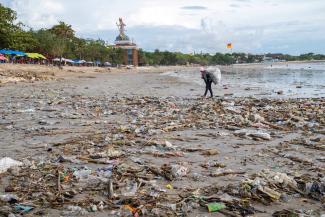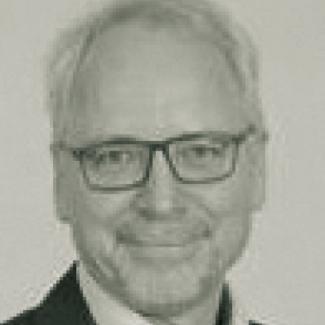Transformative agenda
115 plastic cups in the belly of a whale

Indonesia, the largest archipelago in the world, has a fascinating underwater world. But even in maritime national parks, it has become impossible to miss plastic floating in the water. In view of the huge challenges Indonesia’s waste management faces, this is hardly surprising. The World Bank reckons that, with a population of almost 280 million, the country generated around 70 million tonnes of waste in 2022. Half of the people live in cities and dispose of an estimated 150,000 tonnes per day. Jakarta, the capital, alone generates around 7500 tonnes of household waste daily.
According to the World Bank, regular waste collection only serves about 60 % of urban households. In rural areas, the figure tends towards zero. The implication is that about half of the waste is burnt and about 14 % is disposed of in water bodies and open dumps, according to the Indonesian Ministry of Health. Municipal budgets show that proper waste disposal is not appreciated much. They earmark only 0.7 % of total expenditures for this purpose.
Plastic waste accounts for up to 6.8 million tonnes of Indonesian waste per year, according to the World Economic Forum, and about 620,000 tonnes end up in the ocean. It typically pollutes large rivers that flow into the sea. Through fish and whales, plastic also makes its way through the food chain. For example, 115 plastic cups, 25 plastic bags, four plastic bottles and two plastic sandals were found in the stomach of a sperm whale that died near Bali in 2018. No doubt, the increasingly obvious litter is harming the country’s distinctive tourism sector.
The government of President Joko Widodo has started to take steps to improve waste management with better infrastructure and services. The aspiration is a paradigm shift from largely unorganised disposal to a circular economy. The guiding principle is “3R”, the tried and tested triad of waste avoidance: reduce, reuse and recycle.
By the end of next year, some 80 % of Indonesian households are expected to enjoy regular waste collection, according to the national targets. In 2025, the share is supposed to rise to 100 %. At the same time, the volume of waste is to be reduced by 30 % and marine litter even by 70 %.
Indonesia’s ambitious goals are to be achieved primarily with funding at the municipal and regional level. At the same time, measures are designed to cover costs in the long run. They include waste tariffs that must be both appropriate and socially acceptable, as well as subsidies and private sector involvement. Furthermore, awareness raising is needed to promote behavioural change.
Indonesia has made some initial progress towards the targets, even though they may be unrealistic in many parts. For instance, 72 cities and districts have passed directives to limit the single use of plastic products. Larger municipalities are planning incineration plants. The first two facilities for producing refuse-derived fuel are operational. They can burn up to 2150 tonnes of waste per day. Marine pollution was reduced by about 15 % by 2020, according to the government. Nonetheless, plastic waste in the ocean remains a significant problem.
President Widodo has repeatedly emphasised he wants to move on to a circular economy fast. In a speech delivered at the opening of a mechanical-biological waste treatment plant in 2023, he stated that all subnational governments should take this labour-intensive approach.
Four regulated landfills are setting the right example. They were financed by KfW on behalf of Germany’s Federal Government. Thanks to components like sealed landfill bodies, drainage, leachate purification, composting, sorting as well as gas collection and usage, the standards they meet are comparable to those enforced in the EU. They could reduce greenhouse gases by about an annual 450,000 tons if combined with coverage and gas collection on previously used landfills.
Religious leaders preach environmental awareness
For decades, the waste of a nation with now 280 million people was not disposed of adequately. Change requires a holistic policy and collective rethinking. Multi-stakeholder working groups could provide additional impetus, with an eye to entrenching proper waste management more firmly in society and politics. They are likely to come up with new solutions, moreover. A good early step was to convince religious leaders of these issues. Many of them are now addressing waste and hygiene in their sermons, promoting environmental awareness and personal responsibility.
In the meantime, KfW is currently cooperating with other banks on a major policy-based loan that will allow Indonesia to tackle marine pollution in a meaningful way. The loan will only be disbursed once the government has implemented the jointly defined reforms. Focus areas include waste management, especially in regard to small islands and coastal regions. The programme includes measures that would reduce plastic packaging and facilitate improved data collection.
Burkhard Hinz is the director of the KfW Development Bank office in Jakarta.
burkhard.hinz@kfw.de








